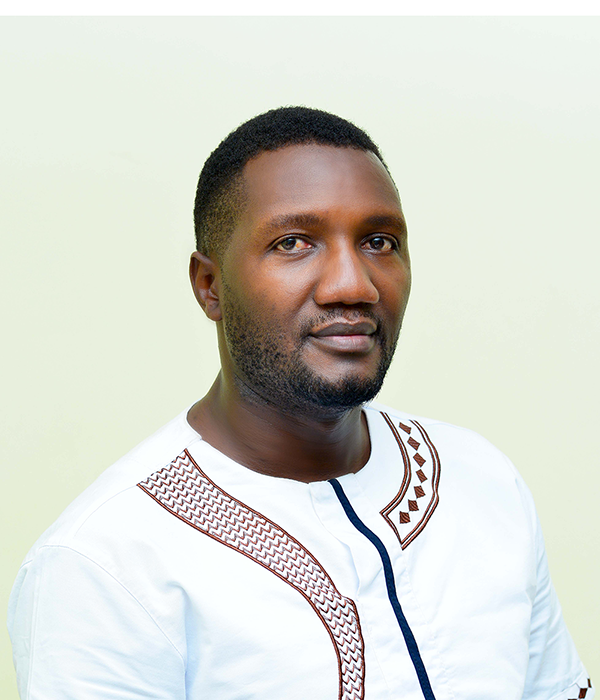Dr. Richard Bagonza Asaba
Lecturer
Qualifications
Dr. Richard Bagonza Asaba holds a Doctorate in Sociology (majoring in gender and development/rural water governance) from Maynooth University and a Post-Graduate Certificate in Sustainable Water Management from Dundalk Institute of Technology, both from the Republic of Ireland. He also holds a Master’s in Environment & Natural Resources (with research on gender and malaria) and a Bachelor of Arts degree in Environmental Management from Makerere University. For the past 13 years, Richard has been working as a lecturer, researcher and consultant. Most of his academic and research work is transdisciplinary with a focus on gender and the environment, especially natural resource extraction, e.g., entomic meat, water governance, adaptation and resilience to climate change and disaster risk reduction. He undertakes research on gender-based violence, livelihoods, food security and gender sensitive programme/project assessments and evaluations.
Courses taught
Richard currently teaches the following courses at SWGS:
BA: GAD2210: Approaches to Gender and Development Practice (2nd Years)
GAD3107: Gender and Development Strategies in Uganda (3rd Years)
GAD3211: Gender and Globalization (3rd Years)
PGD: DGS 6101: Skills for Gender Sensitive Planning and Monitoring (Semester 1)
Grants won and past and present/projects
August 2021 – August 2022—Principal Investigator, project entitled Enhancing the self- defense capacities among adolescent girls and boys to prevent sexual violence in Kikuube District, Uganda. To be undertaken together with AVSI Foundation and No Means No Worldwide. Funded by the Oak Foundation and Global Innovation Fund.
November 2020 – September 2021—Co-Investigator, project entitled Enhancing the Efficiency of Emerging Entomic Meat and Protein Value Chains in Central Uganda. Funded by the Research and Innovation Fund (RIF), Makerere University, supported by the Government of Uganda.
June 2020 – September 2021—Principal Investigator, project entitled Labour Externalisation Pathways to the Gulf Cooperating Countries and Development Implications for Uganda. Funded by the Research and Innovation Fund (RIF), Makerere University, supported by the Government of Uganda.
January 2011- June 2013—Co-Investigator/Steering Committee Member, Project on ‘Adaptation to the Impact of Climate Variability on Food and Health Security in the Cattle Corridor of Uganda’. Implemented by the Africa Innovations Institute (AfrII) and Makerere University, funded by the International Development Research Centre (IDRC), Canada.
Selected Publications
Book Chapters
Mugumya Firminus, Richard B. Asaba, Innocent R. Kamya and Narathius Asingwire (2017). Chapter 6, Part II: Children and Domestic Water Collection in Uganda: Exploring Policy and Intervention Options that Promote Child Protection. IN: David Kawaa-Mafigiri and Eddy Walakira. Child Abuse and Neglect in Uganda, Pp 95-112. Published by Springer, Cham, Switzerland.
Asaba, Richard B. (2016). Chapter 14: Social Aspects of Water Governance in the Context of Climate Change and Agriculture. IN: Rattan Lal, David Kraybill, David O. Hansen, Bal Ram Singh, Theodosy Mosogoya and Lars Olav Eik. Climate Change and Multi-Dimensional Sustainability in African Agriculture, Pp 241-258. Published by Springer, Cham, Switzerland. Available at: https://link.springer.com/chapter/10.1007/978-3-319-41238-2_14
Asaba, Richard B. and G. Honor Fagan (2015). Chapter Seven, Part Two: Woman Water Keeper? Women’s Troubled Participation in Water Resource Management.IN: Munck, R., Asingwire, N., Fagan, G.H. and Kabonesa, C. Water and Development: Good Governance after Neoliberalism, Pp 152-171. Published by Zed Books, London. ISBN: 9781783604920.
Asaba, Richard B., G. Honor Fagan and Consolata Kabonesa (2015). Chapter Two: Women’s Access to Safe Water and Participation in Community Management of Supply. IN: Fagan, G. H, Linnane, S., McGuigan, G.K., Rugumayo, A.I. Water Is Life: Progress to Secure Safe Water Provision in Rural Uganda, Pp 15-30. Published by Practical Action Publishing and Water Is Life: Amazzi Bulamu Project.
Journal Articles
Kankya, C., Nabadda, D., Kabonesa, C., Nyakarahuka, L., Muleme, J., Okware, S. and Asaba, R. (2019). Social Dynamics of Ebola Virus Disease: A Case of Bundibugyo District, Uganda. Health, 11(1): 108-128.
Etongo, Daniel, G. Honor Fagan, Consolata Kabonesa and Richard Asaba B. (2018). Community-Managed Water Supply Systems in Rural Uganda: The Role of Participation and Capacity Development. Accepted for publication on 13/08/18 by the Water Journal, ID is water-348028.
Asaba, Richard B. (2015). Gender and Representation in Local Water Governance in Rural Uganda. Int. J. Agricultural Resources, Governance and Ecology, 11 (3/4): 247–261.
Asaba, Richard B., G. Honor Fagan, Consolata Kabonesa and Firminus Mugumya (2014). Women and Access to Water in Rural Uganda: A Review. wH2O: The Journal of Gender and Water, 3(1): 19–25.
Asaba, Richard B., G. Honor Fagan, Consolata Kabonesa and Firminus Mugumya (2013). Beyond Distance and Time: Gender and the Burden of Water Collection in Rural Uganda.wH2O: The Journal of Gender and Water, 2(1): 31–38.
Reports
Asaba, R.B. (2014). Gender and Vulnerability to Disasters/Climate Risks in Uganda: A Participatory Characterization. Available at https://www.necoc-opm.go.ug/reports/8.%20Gender%20&%20Vulnerability%20to%20Disasters%20In%20Uganda%20-%20study.pdf